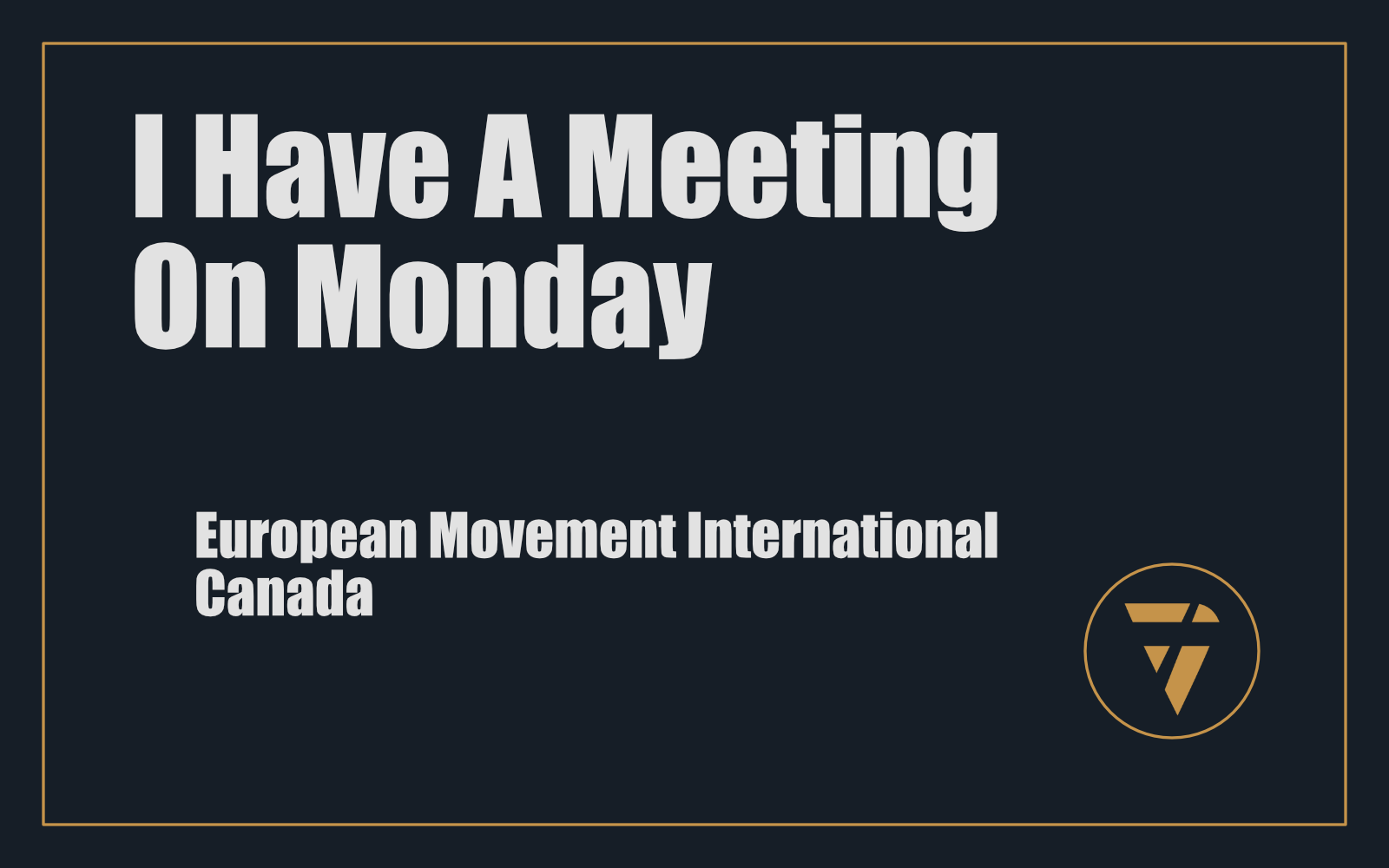I Have A Meeting On Monday

European Movement International | Canada
It starts with a visit.
Monday, 14:45 CEST. The calendar notation is unremarkable. The purpose is not. This is the start of something that should have happened a generation ago.
We are bringing the European Movement to Canada.
And not as a diplomatic nicety. Not as a junior affiliate. Not as a sentimental nod to shared history. No — we are doing this because Canada and Europe are no longer optional to each other. We are doing this because the arc of democracy, sovereignty, and solidarity depends on what happens next — not in Brussels or Ottawa, but in the space between.
Let me name the drift.
For too long, Canada has been the quiet cousin. Friendly, competent, reliable — but structurally absent from the critical global conversations shaping our shared future. We show up in the shadow of the US. We speak in generalities. We issue statements while others build systems. And our alignment with the European Union — one of the most values-aligned, culturally resonant, and strategically necessary alliances in the world — has been treated as background, not foreground.
That era is over.
This Monday marks the beginning of the European Movement Canada — not as a bureaucratic extension, but as a sovereign strategic presence. A national movement designed to forge the connective tissue between two of the world’s most important democratic ecosystems. This is not about symbolism. It's about infrastructure.
We are building what's been missing.
The Case for a Canadian Council
The European Movement International (EMI) has existed since 1948, founded to unite a war-torn continent under the banner of peace, prosperity, and partnership. Over the decades, EMI has become the most important civil society voice for European integration, democracy, and reform. National councils across Europe carry its mission. Now, for the first time, Canada will join them.
But this is not a ceremonial expansion.
Canada is not just another country. We are a mirror. A test. A parallel evolution of European values on North American soil. We are what the EU can be — and what it must learn from.
- Multicultural and multilingual.
- Vast and decentralised.
- Parliamentary but pluralistic.
- Technocratic but tolerant.
- Resource-rich, demographically diverse, and geopolitically misunderstood.
We are a country that has quietly maintained democratic discipline while many of our peers have drifted. But we are also a country dangerously close to irrelevance. Without deeper structural integration with the EU, we will become spectators to the 21st century.
EMI Canada must not be a talking shop. It must be a transmission engine.
Three Vectors of Strategic Necessity
1. Democratic Infrastructure
Populism is not a European problem. It's a world problem. And the defences must be built across borders. EMI Canada will serve as a cultural and civic infrastructure project — reconnecting Canadian civil society to the constitutional, pluralistic, and federalist ideals at the heart of the European project.
This is how we rebuild democratic literacy. Through narrative. Through conversation. Through movement.
2. Economic and Innovation Alignment
Trade agreements are insufficient. CETA was the start — not the structure. The real value lies in regulatory convergence, research partnerships, digital sovereignty frameworks, and AI governance. Canada has the technical talent, the environmental data, and the political stability. Europe has the scale, the urgency, and the institutional capital. EMI Canada can become the sandbox for aligning the future of ethical innovation — not just selling more cheese.
3. Security and Strategic Autonomy
The war in Ukraine has clarified everything. Canada cannot posture as a security actor without deeper engagement in European defence conversations. NATO is not enough. EMI Canada gives us a civilian platform to align our political will and strategic intent with a continent that will be the frontline of global conflict for decades. Not militarily. Politically. Energetically. Economically.
This is not an invitation. This is an instruction.
You are not being asked to observe. You are being called to act.
This Monday, I will meet with the leaders of the European Movement UK, the European Movement International, and those entrusted with extending this legacy into new territory. They are not waiting for bureaucracy. They are looking for motion.
We will map the stakeholders. Review the signups. Design the scaffolding. And then — build the system.
If you are Canadian, European, or committed to either — join us.
- If you are in civil society, bring your cause. Let’s scale it.
- If you are in media, bring your reach. Let’s inform with consequence.
- If you are in academia, bring your research. Let’s weaponise rigour.
- If you are in government, bring your portfolio. Let’s align.
- If you are a founder, builder, or operator — bring your velocity. Let’s install.
We will not issue reports. We will not wait for permission. We will build the Canadian Council of the European Movement with the urgency this moment demands.
Not someday.
Monday.
What Happens Next
If this matters to you — move. Don’t forward. Don’t “think about it.” Declare your proximity now.
You want to help?
Say yes.
You want to partner?
Bring the map.
You want to be briefed?
Read this again.
This is not a brand expansion. This is a realignment of sovereign strategic will.
We begin Monday.
Be ready.
Ben Beveridge
Proconsul
This is what I’m working on. Tell me what you think, I enjoy the conversation! Subscribe and follow the work in real time.
Thanks!
B

Canada and Europe are not aligned — they’re just adjacent.
We signed treaties. We share values. But we don’t move together.
That ends Monday. EMI Canada is the start of shared consequence.
Join me.
PS -






